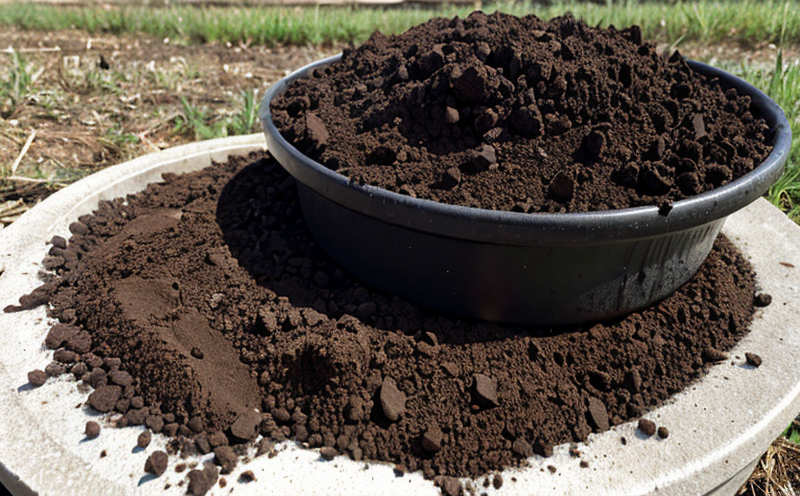ISO 5667-23 Sediment Analysis from Landfill Leachates
The ISO 5667-23 standard provides a detailed protocol for sediment analysis in landfill leachate. This method is crucial for waste management and recycling testing as it ensures that the sediments extracted from landfills are accurately characterized, which can inform decisions on resource recovery, environmental impact assessment, and compliance with regulatory standards.
The process begins with the collection of a representative sample of leachate from the landfill. This sample must be collected in accordance with ISO 5667-23 to ensure accuracy and consistency. Once collected, the leachate is allowed to settle for an appropriate period, during which the sediment settles at the bottom.
The next step involves the careful removal of the settled sediment using a sterile spatula or other suitable tool, ensuring not to disturb the liquid phase above it. The sediments are then transferred into pre-weighed containers and dried in an oven under controlled conditions (typically at 105°C for 24 hours). After drying, the samples are weighed again to determine their moisture content.
The analysis of these sediments is critical as they contain valuable information about the composition of the landfill contents. The sediment can be analyzed using a variety of techniques including X-ray fluorescence (XRF), inductively coupled plasma mass spectrometry (ICP-MS), and Fourier transform infrared spectroscopy (FTIR). These analyses help identify metals, organic compounds, and other contaminants present in the sediments.
Understanding these components is essential for waste management strategies. For instance, some heavy metals may be recoverable as raw materials, while others require special handling to prevent environmental harm. The data obtained from this analysis can also inform decisions on landfill design and operation, ensuring that leachate generation is minimized.
The results of the sediment analysis are then compared against relevant standards such as ISO 15267-1 for heavy metals in water and soil. Compliance with these standards ensures that waste management practices meet both environmental protection requirements and resource recovery goals.
For quality managers, compliance officers, and R&D engineers, this service provides critical data to support decision-making processes related to waste management and recycling. It also helps procurement teams source materials more sustainably by identifying potential sources of raw materials from recycled waste streams.
Why It Matters
The proper characterization of sediments in landfill leachates is not just a technical exercise; it has profound implications for environmental protection, resource recovery, and compliance with regulatory standards. Accurate sediment analysis helps ensure that the waste management practices used are both effective and environmentally sound.
- It supports sustainable resource recovery by identifying potential raw materials within waste streams.
- It aids in minimizing landfill volume through better understanding of leachate generation processes.
- It enhances compliance with environmental regulations, particularly those related to water quality.
The sediment analysis also provides insights into the long-term stability of landfills and helps predict potential risks associated with landfill operations. This information is invaluable for stakeholders involved in waste management and recycling, as it informs strategies aimed at reducing environmental impact while optimizing resource use.
Eurolab Advantages
EuroLab offers unparalleled expertise in performing ISO 5667-23 sediment analysis from landfill leachates. Our state-of-the-art facilities and highly trained personnel ensure that every step of the process is conducted with precision, accuracy, and repeatability.
- Comprehensive Analysis: We provide a full suite of analyses including XRF, ICP-MS, FTIR, and others to give you a complete picture of your sediment composition.
- Regulatory Compliance: Our results are always aligned with the latest international standards such as ISO 5667-23, ensuring that you meet all relevant regulatory requirements.
- Rapid Turnaround Times: We understand the importance of timely analysis for decision-making. EuroLab prides itself on delivering accurate and reliable data in a fraction of the time it would take with other providers.
Beyond just providing high-quality analytical services, we also offer valuable insights into how to use these results effectively. Our team can work closely with you to interpret the data and suggest actionable steps based on our findings.
Environmental and Sustainability Contributions
- Reduction in Landfill Volume: By identifying potential raw materials within waste streams, we help reduce the volume of landfill material that needs to be managed.
- Enhanced Resource Recovery: Accurate sediment analysis can lead to more efficient resource recovery processes, turning waste into valuable resources.
- Environmental Protection: Ensuring compliance with environmental regulations helps protect aquatic ecosystems from contamination by leachate components.
The insights gained from our ISO 5667-23 sediment analysis contribute significantly to sustainable practices in waste management and recycling. By leveraging this information, stakeholders can make informed decisions that balance economic efficiency with environmental responsibility.





